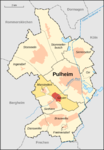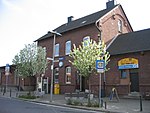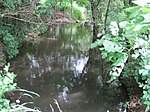Brauweiler Abbey
1020s establishments in Germany1020s establishments in the Holy Roman Empire1024 establishments in Europe1803 disestablishments in the Holy Roman EmpireBenedictine monasteries in Germany ... and 4 more
Buildings and structures in Rhein-Erft-KreisBurial sites of the EzzonidsChristian monasteries established in the 11th centuryMonasteries in North Rhine-Westphalia

Brauweiler Abbey (German: Abtei Brauweiler) is a former Benedictine monastery located at Brauweiler, now in Pulheim near Cologne, North Rhine-Westphalia, in Germany.
Excerpt from the Wikipedia article Brauweiler Abbey (License: CC BY-SA 3.0, Authors, Images).Brauweiler Abbey
Ehrenfriedstraße,
Geographical coordinates (GPS) Address Website External links Nearby Places Show on map
Geographical coordinates (GPS)
| Latitude | Longitude |
|---|---|
| N 50.961111111111 ° | E 6.7827777777778 ° |
Address
LVR Kulturzentrum Abtei Brauweiler (Abtei Brauweiler)
Ehrenfriedstraße
50259
North Rhine-Westphalia, Germany
Open on Google Maps











